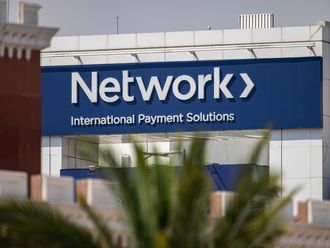London: Barclays is set to be fined close to £38 million (Dh228 million) for failing to keep clients’ money separate from its own three years after the bank paid a penalty of £1 million (Dh6 million) over the same issue.
The fine — a record for this type of misconduct — is expected to be announced by the UK’s Financial Conduct Authority as early as Tuesday. It follows a £33 million fine for JPMorgan Chase in 2010 for failing to segregate up to $23 billion (Dh84.46 billion) in client money.
Barclays is being fined for intermingling billions of pounds of client money with its own funds in its investment bank between 2007 and 2012. This is frowned upon by the regulator because it would be harder to repay customers if the bank collapsed.
The sums involved at Barclays are lower than at JPMorgan, according to a person familiar with the situation, but the British bank’s bigger fine reflects the FCA’s determination to punish recidivism as well as the overall increase in the size of penalties.
One person familiar with the matter said other big investment banks were facing similar investigations by the FCA. Barclays and the FCA declined to comment.
The issue of client money segregation came under increased regulatory scrutiny after the 2008 collapse of Lehman Brothers left many clients unable to access their funds.
According to a person familiar with the matter, there has been a debate between Barclays and the FCA over whether the intermingled client money was ever at risk — even theoretically — or if it would merely have taken longer to untangle it from the bank’s own funds if it went bust.
It is understood that Barclays has been granted a discount of about 30 per cent on its fine for cooperating with the FCA’s investigation. The size of the fine was first reported by Sky News.
While the fine for a failure to segregate client assets and to keep proper records relates to a time shortly before Antony Jenkins took over as chief executive in 2012, it is another blow to his attempts to rebuild Barclays’ reputation.
Regulatory risk is one of the big negative factors weighing on Barclays’ share price, which has fallen 15 per cent in the past year, underperforming the sector.
The fine would clear one regulatory issue hanging over Barclays before John McFarlane takes over as chairman after next April’s annual meeting. The Aviva chairman was named as Sir David’s Walker’s replacement this month.
Since paying £290 million to settle allegations that it manipulated Libor in 2012 — an agreement that led to the resignation of its then chief executive and chairman — Barclays has become embroiled in a number of other legal and regulatory issues.
It is one of a handful of foreign exchange dealing institutions at the centre of a global investigation into alleged collusion and rate-rigging in the $5.3 trillion-a-day currency market.
Barclays has also been sued by New York’s leading regulator for allegedly favouring high-frequency traders using its anonymous “dark pool” trading venue, while misleading institutional investors — allegations that the bank has disputed.
Meanwhile, the Serious Fraud Office is looking at Barclays’ dealings with Qatar during its 2008 emergency cash call.
In 2011, Barclays paid a £1.1 million fine for putting clients’ money at risk by failing properly to separate it from its own funds over a period of more than eight years.
At the time, the bank said that the segregation error was “corrected on discovery”. It said that Barclays Capital did not profit in any way and added that it had substantially increased its investment in compliance since 2009.
— Financial Times










